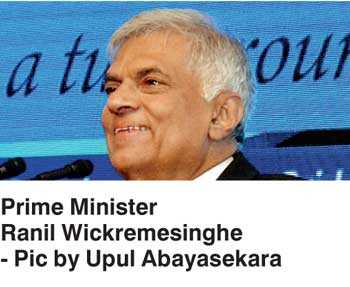Wednesday Feb 18, 2026
Wednesday Feb 18, 2026
Saturday, 15 September 2018 00:10 - - {{hitsCtrl.values.hits}}
 As Sri Lanka reaches macroeconomic stability, Prime Minister Ranil Wickremesinghe said the economy was now moving into ‘uncharted territory,’ calling for active private-public engagement to propel an inclusive growth trajectory.
As Sri Lanka reaches macroeconomic stability, Prime Minister Ranil Wickremesinghe said the economy was now moving into ‘uncharted territory,’ calling for active private-public engagement to propel an inclusive growth trajectory.
Delivering the keynote address at the closing session of the two-day Sri Lanka Economic Summit 2018, he assured that by 2025 the country would have a positive growth rate, capitalising on diversified exports, increased foreign investments and enhanced competitiveness. “In the first round we have achieved macroeconomic stability. Now comes the next stage, where the private sector is involved — the growth. By 2025, we should have a positive record and we can be sure that debt is behind us. We have tackled the issue of debt and it certainly will be less than 60% of GDP, but for that we have to work together,” he added.
Having observed the resilient Sri Lankan private sector and economy, the Prime Minister said he believed the country could slowly yet steadily reach the next wave of growth within the framework that had been put in place during the past three years.
“Now we are in uncharted territory; the macro economy was not so difficult, this is the challenge. We have to go together.
It cannot be done by the Government and it has to be done by the private sector and the investors you all bring in. It is not an easy journey. Let’s see how fast and far we can go. We may not be able to move as fast we like, but it is better to move slowly and steadily,” Wickremesinghe said.
He also recognised that exports alone could not be the sole driver as the entire value chain and domestic manufacturers and industries had to also be taken into account.
“The domestic market industries of today must also be the exporters of tomorrow. You cannot allow the domestic manufacturing industries to go down, they are the biggest employment creators in this country and they have managed to survive during the worst times of the economy,” he pointed out.
The Prime Minister stressed that until Sri Lanka moved beyond tea, apparel and solid tyre exports, no other measure taken would deliver the desired outcome to increase competitiveness.
Despite having access to European Union markets with the opportunity of exporting over 60,000 items with GSP+ facility, the Premier stated that the export sector did not have sufficient products to even benefit from markets.
“We have GSP+, where we have the opportunity to send 60,000 items to the EU market, but we can’t even export 60 items. We have got one opening in the EU, but we cannot even utilise it.”
As Sri Lanka’s three-year program with the International Monetary Fund (IMF) comes to an end next year, he said it was important to buckle up as the journey forward was going to be challenging. “From 2019 onwards, we cannot be running back to the IMF. This time it is going to be a hard journey and we have to be ready for it,” he added.
The Prime Minister said that the Treasury was now in discussion with the IMF team here on the tax concerns that were raised by the private sector.
Wickremesinghe also highlighted the importance of attracting foreign investments as there were capacity constraints for Sri Lankan companies to move into new areas.
“Whether we like it or not, we have to attract foreign investments, which will help you all to expand the existing product portfolio. If we are looking at manufacturing, we have to look at both domestic and foreign investments for expansion. Attracting foreign investments does not mean wiping out the Sri Lankan sector, but reaching out to global markets in a much more effective manner Whatever help wanted to become competitive, we will help you,” he added.
Acknowledging that the Sri Lanka-Singapore Free Trade Agreement (SLSFTA) was the most debated among the private sector, the Prime Minister dismissing any concerns assured that it provided opportunities for local enterprises. He also explained that Chinese investments were encouraged as they helped local companies expand and brought their own technology as well as investments.
He stressed that they were now working around to introduce an investment law, which looks at some of the aspects of the ease of doing business, while identifying key departments and institutions necessary to boost investments.
The Premier said there would be an opportunity for an ongoing dialogue with the private sector and chambers to share input, going forward. “Out of the hundreds of departments, we identified 10 major departments that matter the most to the private sector and I hope the monthly meetings with the chambers and getting secretaries of the key ministries are the way forward to resolve any issues that comes on the way,” he said.
Building skills needed for future firms particularly in the knowledge-based sector, he said the Government was working out a good package for the ICT sector which had performed well in the export market within a short span of time.
As bureaucracy moves slowly, Wickremesinghe stated there had been delays in implementing some of the reforms, which he termed as a cost of stability.
“Certainly, we have to pass more hurdles as there are more ministries. I think we are about six to eight months behind time in getting some of the reforms through. By now we should have got them through, but we are still talking it over and getting ready for the next Budget. At least we have a stable environment and whatever we do will not be reversed,” the Prime Minister emphasised.